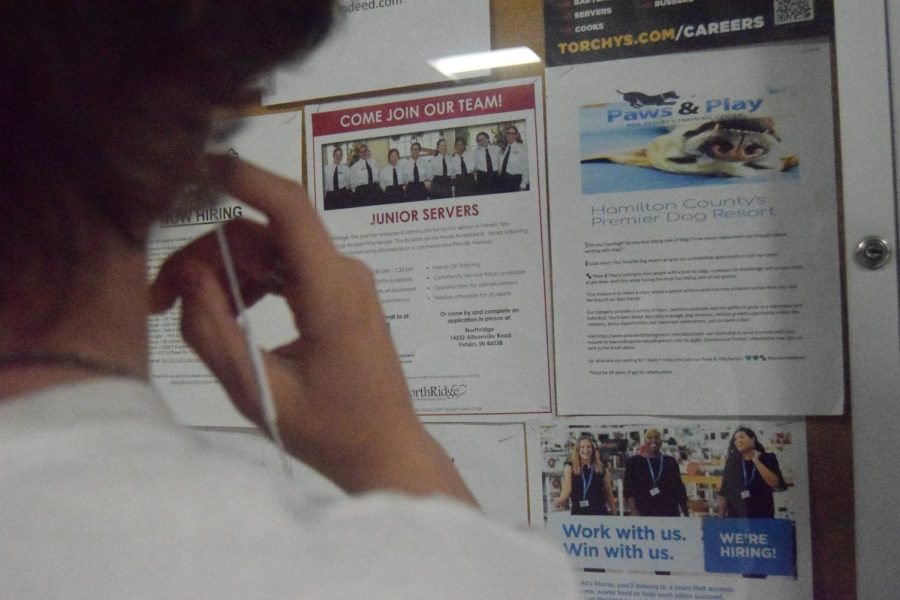Dirt cheap: In today’s economic climate, teenagers are finding their work isn’t valued
November 1, 2022
Noah Wilson is flipping patties at a local burger joint. At 14 years old, he is working the grill— illegally. He doesn’t often get the chance to work, but when he is scheduled, he works long hours, often until late at night— illegally. His shifts often stretched up to seven hours long— again, illegally. Despite his, and many other teens,
Issues for teenagers in the workplace like these are more common than one might think. Due to an April 2020 law change, minors in the labor industry are significantly less likely to benefit from a job than they were previously, and the cracks are starting to show.
The Indiana Department of Labor (DOL) set guidelines and regulations for businesses to follow when employing minors. However, many employers appear to be ignoring these guidelines. A recent investigation by the U.S. Department of Labor found that a Fort Wayne-based operator of 11 Dairy Queen franchise locations violated child labor provisions of the Fair Labor Standards Act at all of his locations.
This event raised some vital questions: How often are these violations going unchecked? Who is looking after teenagers in the workforce? And most importantly, why did the laws around labor change so drastically in recent years?
As a result of the investigation, the Indiana Dairy Queen operator was fined more than $40,000 for the wage exploitation of over 100 minors. However, there are many more businesses employing minors that could be subject to the same exploitation that go unnoticed and unreported.
Wilson is a sophomore at Noblesville High School, and he worked his first ever job over the summer. He ended up quitting within two months of working there because of the toxic work environment.
“So I went there, and I worked multiple jobs. I worked at [the] grill, which is illegal. You have to be over the age of sixteen; I’m fourteen.” Wilson said.
However, the grill wasn’t Wilson’s only issue. The hours he worked presented major problems as well. As much as Wilson tried to tell his employers that he legally wasn’t able to do the things they wanted him to, he says nothing changed.
According to the Indiana Department of Labor’s website, “[A] 14/15 year old can only work until 7:00pm regardless of the day of the week except from June 1 to Labor Day. From June 1 to Labor Day, a 14/15 year old can work until 9:00pm except once school is back in session.” And yet, Wilson says those legal restrictions were overlooked and ignored.
“When I worked evenings, I would work from 6:00 to 11:00 or 5:00 to 11:00.” Wilson said.
According to the DOL, in Indiana teenagers under the age of 16 are permitted to work three hours a day and only until 7:00 PM. Even during the summer, minors under 16 are not allowed to work any later than 9:00 PM.
Previous labor laws were tailored to protect teens, so why must the modern teen struggle so much to balance work, school, and life? Craig McCaffrey, principal at NHS, noticed the problem has become widespread.
“I communicate [with] principals from around the state.” McCaffery said, “[These principals] have been very concerned about students being worked [for] too many hours.”
The DOL is responsible under state law for protecting workers’ rights, including teenagers. The department says they use a variety of methods to monitor workplace compliance.
“The Bureau of Youth Employment conducts random inspections throughout the state. In addition, it performs inspections when a complaint is filed,” Stephanie McFarland, a public affairs consultant with the DOL said. “Inspections can result in financial penalties. These penalties vary based on the infraction/citation and how many times an employer has committed the violation.”
Indiana labor laws require employers to provide records and access to workers under the age of 18 to the Indiana Department of Labor to investigate the employer’s compliance with working conditions for minors. The DOL claims problems faced by teen workers are rare and the current situation does not warrant investigation.
“We take surveys with lots of students around Indiana,”McFarland said. “We haven’t really seen cause for concern.”
However, McCaffrey disagrees and says he has personally seen the effect that working long hours has on students, especially when work permit responsibility was transferred from the school to businesses. He points out a legislation change in Indiana in 2020 that eliminated work permits.
McCaffrey says that schools today have very little control over the work schedule and workload on a student outside of school. Previously, schools were responsible for monitoring student grades and work schedule. If a student’s grades dropped too low, or a student was working too many hours, schools were previously able to pull a student’s work permit in hopes that it would allow the student to focus more attention on school. Now, it’s up to employers to make sure that a minor is only working at permitted times according to state law.
“It’s tough, because I don’t have the ability to help the student out as much as I used to,” McCaffrey said. “So we feel a little bit helpless without that part,”
Another milestone legal decision was the removal of break requirements for youth workers. Indiana law currently states, “As of April 1, 2020, the Indiana youth employment law removed the break/lunch requirement for minors. Employers are no longer required to provide a minor with a break or lunch regardless of the number of hours worked in a day,” the Indiana DOL website says. Previously, minors were required to have a break with a minimum duration of at least 30 minutes for every 6 hours worked.
Another major issue appears with the sense of self-advocacy most teens may not have developed in adolescence. Businesses might not be intentionally taking advantage of teenagers, McCaffrey says, but whether it’s intentional or not, kids are still suffering because of a lack of supervision.
“I don’t think that they feel like they can tell their boss that ‘Well, no, by law, I can’t do this.’ And they’re put in a tough spot,” McCaffrey said. “Some of our students, the work they do actually pays bills at home. Not everyone’s working so they can have concert tickets.” McCaffrey points out that some students are a source of income for their family, which could create discomfort around refusing an employer. If the student loses their job, it could mean disaster for their family. Businesses can prey on that vulnerability, McCaffrey says, and no one would be the wiser.
The DOL even carves out an exception within the Youth Employment System (YES) for businesses with less than 5 employees. “Employers are only required to register in YES if they employ 5 or more minors. Employers may voluntarily register on YES if they employ 4 or less minors.” Essentially, if a business falls into a fairly broad demographic, they needn’t even register with the department of labor.
According to McCaffrey, no one —not even school administrators— know who is currently in charge of monitoring student workers since the work permit requirements were changed in 2020.
But, businesses across the country are experiencing labor problems of their own, specifically an unprecedented shortage of labor within the workforce. The U.S. workforce has been shrinking since the 2020 pandemic, especially for jobs that lower wage jobs in fast food or retail, these are the jobs that are frequently filled by teenagers working their first job.
“Working that long, I didn’t really get time for homework. I would work [then] just and I would be super exhausted,” Wilson said.
Because of his job, he experienced stress that, according to him, greatly affected his mental health, and the way he related to his surroundings. Junior Addy Unger felt the same way.
“I will never work there again,” Unger said. “The managers did absolutely nothing to defend
me, and they did absolutely nothing to stop it.”






